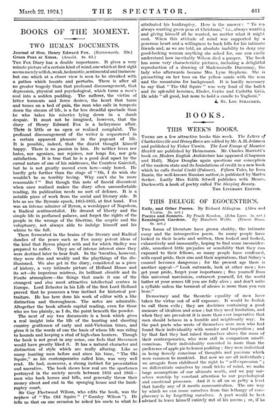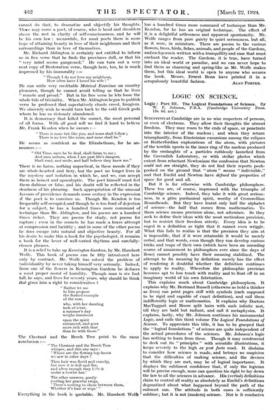THIS DELUGE OF EGOCENTRICS.
Two forms of literature have grown shabby, the intimate essay and the introspective poem. So many people have looked in their hearts and written, then looked and looked, exhaustively and incessantly, hoping to find some inconsider- able, unnoticed little prejudice or sensibility that they can expound to their fellows, so many people have confessed, with equal pride, their sins and their aspirations, that Sidney's counsel becomes dangerous ; for the present age there is another appeal—" Look outwards, look at other men ; for- get your pride, forget your importance ; free yourself from this universal narcissism, extravert yourself, let the world batter at your senses till you are fully alive ; and don't write a syllable unless the torment of silence is more than you can bear."
Democracy and the theoretic equality of men have taken the virtue out of self exposure. It would be foolish to call them evils ; they are doctrines containing a good measure of idealism and sense ; but they need limitation, and when they are prevalent it is more than ever imperative that men should behave in a humble and neighbourly way. In the past poets who wrote of themselves were men who had found their individuality with wonder and inspiration ; and by that fact they had raised themselves above the mass of their contemporaries, who were still in comparison unself- conscious. Their individuality consisted in more than the preference of apple pie to lemon pudding : they were individual in being fiercely conscious of thoughts and passions which were common to mankind. But now we are all individuals ; we arrogate from childhood the right to " self-expression " ; we differentiate ourselves by small tricks of mind, we make large assumptions of our ultimate worth, and we pay our- selves worship by constant attention to our psychological and emotional processes. And it is all on so petty a level that hardly any of it merits communication. The one way by which we can rouse ourselves from this lethargy of com- placency is by forgetting ourselves. A poet would be best advised to leave himself entirely out of his poems ; or, if be
This may come a poet, of course, who is head and shoulders above the rest in clarity of self-consciousness, and he will be his own law : meanwhile, for most poets there is more hope of attaining beauty in love of their neighbours and their surroundings than in love of themselves.
Mr. Richard Aldington is certainly not entitled to inform us in free verse that he finds the provinces dull, or that his " very mind seems gangrened." He can turn out a very neat copy of Restoration verse, though here, too, he is much impressed by his immorality :-
" Though I do not love my neighbour, How often have I loved his wife ! "
He can write very creditable Metrical Exercises on country pleasures, though he cannot avoid telling us that he lives " remote and proud." But in his free verse he lets loose the whole tide of triviality. When Mr. Aldington began to publish -verse he professed that superlatively chaste creed, Imagism. We sincerely wish he would turn back to the cold Greek gods whom he has so riotously abandoned.
It is democracy that killed the sonnet, the most personal of all forms. With all good will we find it hard to believe Mr. Frank Kendon when he swears :—
" There is none fair like you, and none shall follow ;
There is no love like mine, and none shall be."
He seems as confident as the Elizabethans, for he an- nounces :-
" Old Time, save he be deaf, shall listen to me
And men unborn, when I am past life's dangers, Shall read, and smile, and half believe they knew me."
There is no harm, nothing unpoetical, in these moods if they arc whole-hearted and fiery, but the poet no longer lives in the mystery and isolation in which he, and we, can accept them as honest and apocalyptic. The poet-himself must feel them dubious or false, and his doubt will be reflected in the deadness of his phrasing. Such appropriation of the unusual favours of providence demands some ecstasy in the expression if the poet is to convince us. Though Mr. Kendon is too frequently self-occupied, and though he is too fond of dejection for a subject, he has a hundred times more command of technique than Mr. Aldington, and his poems are a hundred times richer. They are poems for study, not poems for rapture ; even in the sonnets he has made a brave attempt at compression and lucidity ; and in some of the other poems he does escape into natural and objective beauty. For all his desire to make this a book for the psychologist, it remains a book for the lover of well-varied rhythms and carefully- chosen phrases.
It is a relief to take up Kensington Gardens, by Mr. Humbert Wolfe. This book of poems can be fitly introduced here only by contrast. Mr. Wolfe has solved the problem of ;ndividuality by never taking himself very seriously. Indeed, from one of the flowers in Kensington Gardens he deduces a most proper moral of humility. Though man is six foot tall, he says, and lives for seventy years, why should he think that gives him a right to consideration ?
" Rather let me to him propose the flushed example of the rose,
who, with her dazzling inch of scent, a summer's day weighs imminent
upon the spirit entranced, and goes more rich with that than he with those."
The Chestnut and the Beech Tree point to the same conclusion :-
" The Chestnut and the Beech Tree whisper, and this one says :
. Where are the flowing top-knots we saw in other days ?
Then hair was florid and comely, but now it is dull and flat, and often enough they hide it under a bowler hat.'
The other answers, gently rustling her gra,ceful twigs, . There's nothing to chose between them, Whether it's hair or wigs.' "
Everything in the book is quotable. Mr. Humbert Wolfe















































 Previous page
Previous page